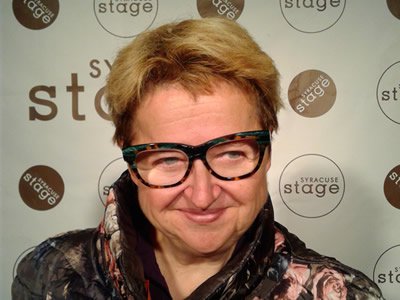A Blueprint for Lithuanian Arts
Fulbright scholar Irena Alperyte excels in Janklow Arts Leadership Program

Irena Alperyte was a student in Moscow during the period of perestroika and glasnost. That was the era when Communist Russia underwent political and social changes that included freedom of speech and intellectual inquiry.
“I could say anything on the street,” says Alperyte, a Fulbright scholar from Lithuania who is researching arts and community engagement this semester at the Janklow Arts Leadership Program. Alperyte teaches at Vilnius Academy of Arts in Lithuania, the first of the former Soviet republics to declare its independence.
She is proud that world-renowned artists hail from Lithuania. They include Jonas Mekas, a Lithuanian-American filmmaker, poet and artist who has been called the godfather of American avant-garde cinema. She also cites George Maciunas, a Lithuanian-American artist and a founding member and the central coordinator of Fluxus, a movement that rejects the elitism of “high art.”
In addition, many Litvaks (Lithuanian Jews) gained fame as American artists and producers, including Lee Shubert, Al Jolson, Woody Allen, Joe Papp and Jascha Heifetz.
Despite the promises of perestroika (reformation), Lithuania’s arts remain entangled in bureaucracy. “Now art is independent, but we need a framework,” Alperyte says. “We make good theater and our acting is good, but our financing and management are terrible.”
One challenge is the economy; after independence, a quarter of Lithuania’s population emigrated in search of jobs. But the country enjoys a long history of appreciating the arts—especially opera and drama. “We stream Metropolitan Opera shows in movie theaters, and people dress up,” she explains. “Even with a poor economy, there is a tradition of reading, movies, concerts, exhibitions. You cannot kill this tradition.”
Lithuanians like classics like Verdi’s “La Traviata” and Tchaikovsky’s “The Nutcracker,” she says. Theater lovers are familiar with the works of Virginia Woolf, Edward Albee and Eugene O’Neill. They also enjoy English playwrights Mark Ravenhill and Sarah Kane, and appreciate the work of Robert Wilson, the American avant-garde director. “We like to see hot issues and modern dramas,” Alperyte says.
She’s visiting Syracuse museums, theaters and arts organizations, seeking examples she can apply to art programs in Lithuania.
Few private foundations exist in Lithuania, while “Here you have a system of private charity and boards,” she explains. “The grantmaking scene is much richer and more diverse here.”
Mark Nerenhausen, professor of practice and founding director of the Janklow Program, says Alperyte’s visit highlights the Janklow Program’s interdisciplinary nature. “We are honored that Professor Alperyte has chosen to conduct her research with the Janklow program and the Janklow students will benefit greatly from her insights and perspectives.”
Alperyte got her first taste of American theater and its management practices while studying at New York University in 1997 as a Muskie fellow. The school’s tradition of combining business and art in the graduate program provides a helpful model for Lithuania, she says.
“In the United States, there is a good legal basis and good conditions to create art,” she says. “Lithuania needs a blueprint for the arts.”
Lithuanian artists face numerous challenges, she says. Here, both amateurs and professionals can create art. In Lithuania, working as an artist requires a diploma. Because of high production costs, artists have little freedom to experiment for the sake of “pure” art. “If you want to survive, you have to be commercial and market oriented and focus more on making ends meet than on making art,” she says.
Alperyte has been surprised at the level of grassroots activism and charity in the United States. Food pantries, for example, offer a relevant lesson for artists. “Europe is very dependent on the government for art, and it imprisons you,” she says. “Here, if you want to run a theater company, you do it. You don’t wait for the government.”
